Related Research Articles

Marika Rökk was a German-Austrian dancer, singer and actress of Hungarian descent who gained prominence in German films in the Nazi era. She resumed her career in 1947 and was one of Europe's most famous operetta singers, performing onstage until 1986.
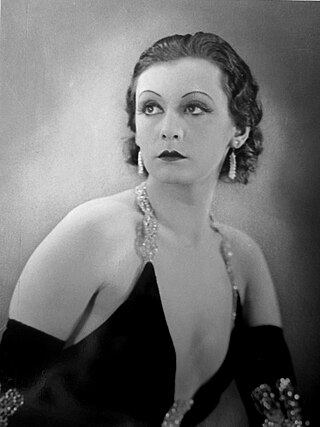
Zarah Leander was a Swedish singer and actress whose greatest success was in Germany between 1936 and 1943, when she was contracted to work for the state-owned Universum Film AG (UFA). Although no exact record sales numbers exist, she was probably among Europe's best-selling recording artists in the years prior to 1945. Her involvement with UFA caused her films and lyrics to be identified as Nazi propaganda. Though she had taken no public political position and was dubbed an "Enemy of Germany" by Joseph Goebbels, she remained a controversial figure for the rest of her life. As a singer, Leander was known for her confident style and her deep contralto voice, and was also known as a "female baritone".
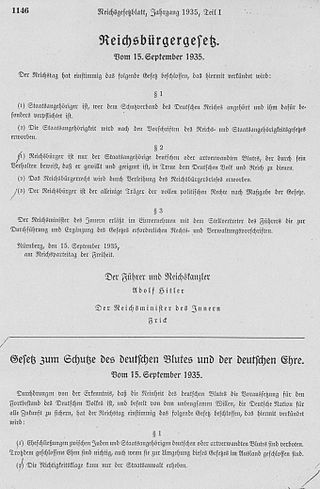
Rassenschande or Blutschande was an anti-miscegenation concept in Nazi German racial policy, pertaining to sexual relations between Aryans and non-Aryans. It was put into practice by policies like the Aryan certificate requirement, and later by anti-miscegenation laws such as the Nuremberg Laws, adopted unanimously by the Reichstag on 15 September 1935. Initially, these laws referred predominantly to relations between ethnic Germans and non-Aryans, regardless of citizenship. In the early stages the culprits were targeted informally; later, they were punished systematically and legally.

Valaida Snow was an American jazz musician and entertainer who performed internationally. She was also known as "Little Louis" and "Queen of the Trumpet," a nickname given to her by W. C. Handy.

Afro-Germans or Black Germans are Germans of Sub-Saharan African descent.

Mephisto – Novel of a Career is the sixth novel by German author Klaus Mann.

Antonia del Carmen Peregrino Álvarez, known by her stage name Toña la Negra, was a Mexican singer and actress of partial Haitian ancestry, known for her interpretation of boleros and canciones written by Agustín Lara.

Lucille Eichengreen was a survivor of the Łódź (Litzmannstadt) Ghetto and the Nazi German concentration camps of Auschwitz, Neuengamme and Bergen-Belsen. She moved to the United States in 1946, married, had two sons and worked as an insurance agent. In 1994, she published From Ashes to Life: My Memories of the Holocaust. She frequently lectured on the Holocaust at libraries, schools and universities in the U.S. and Germany. She took part in a documentary from the University of Giessen on life in the Ghetto, for which she was awarded an honorary doctorate.

Princess Marie Adelheid of Lippe was a socialite and writer who was active in Nazi Germany. As the wife of Hanno Konopath, a prominent Nazi official, Marie Adelheid was a well known and ardent supporter of the Nazi regime. She was instrumental in the Nordic Ring, a forum for the discussion of issues concerning race and eugenics.

The propaganda of the Nazi regime that governed Germany from 1933 to 1945 promoted Nazi ideology by demonizing the enemies of the Nazi Party, notably Jews and communists, but also capitalists and intellectuals. It promoted the values asserted by the Nazis, including Heldentod, Führerprinzip, Volksgemeinschaft, Blut und Boden and pride in the Germanic Herrenvolk. Propaganda was also used to maintain the cult of personality around Nazi leader Adolf Hitler, and to promote campaigns for eugenics and the annexation of German-speaking areas. After the outbreak of World War II, Nazi propaganda vilified Germany's enemies, notably the United Kingdom, the Soviet Union and the United States, and in 1943 exhorted the population to total war.

Negermusik was a derogatory term used by the Nazi Party during the Third Reich to demonize musical styles that had been invented by black people such as blues and jazz. The Nazi Party viewed these musical styles as degenerate works created by an "inferior" race and they were therefore prohibited. The term, at that same time, was also applied to indigenous music styles of black Africans.
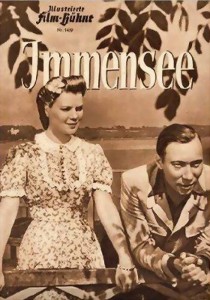
Immensee: ein deutsches Volkslied is a German film melodrama of the Nazi era, directed in 1943 by Veit Harlan and loosely based on the popular novella Immensee (1849) by Theodor Storm. It was a commercial success and, with its theme of a woman remaining faithful to her husband, was important in raising the morale of German forces; it remained popular after World War II.
Brown Babies is a term used for children born to black soldiers and white women during and after the Second World War. Other names include "war babies" and "occupation babies." In Germany they were known as Mischlingskinder, a term first used under the Nazi regime for children of mixed Jewish-German parentage. As of 1955, African-American soldiers had fathered about 5,000 children in the American Zone of Occupied Germany. In Occupied Austria, estimates of children born to Austrian women and Allied soldiers ranged between 8,000 and 30,000, perhaps 500 of them biracial. In the United Kingdom, West Indian members of the British military, as well as African-American soldiers in the US Army, fathered 2,000 children during and after the war. A much smaller and unknown number, probably in the low hundreds, was born in the Netherlands, but the lives of some have been followed into their old age and it is possible to have a better understanding of the experience that would unfold for all of the Brown Babies of World War II Europe.
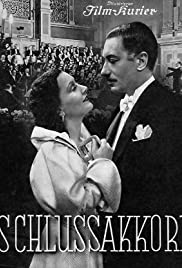
Schlußakkord is a German film melodrama of the Nazi period, the first melodrama directed by Detlef Sierck, who later had a career in Hollywood as Douglas Sirk and specialised in melodramas. It was made under contract for Universum Film AG (UFA), stars Lil Dagover and Willy Birgel and also features Maria von Tasnady, and premièred in 1936. It shows stylistic features later developed by Sierck/Sirk and makes symbolic and thematic use of music.
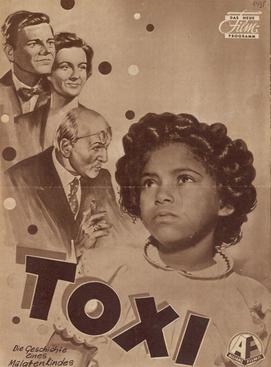
Toxi is a 1952 West German drama film directed by Robert A. Stemmle and starring Elfie Fiegert, Paul Bildt and Johanna Hofer. The film's release came as the first wave of children born to black Allied servicemen and white German mothers entered school.
Alice Ludwig was a German film editor who worked on many films and television series between 1932 and 1973. After first entering the film industry during the Weimar Republic, she worked continuously during the Nazi era. Following the Second World War she edited Marriage in the Shadows (1947), an anti-Nazi work of the rubble film period. Much of her later film work was in popular melodramas such as Gabriela (1950). From the 1960s onwards she switched to working in television, her final employment being the editing over fifty episodes of the crime series Hamburg Transit.

Salto Mortale is a 1953 West German drama film directed by Viktor Tourjansky and starring Margot Hielscher, Philip Dorn and Karlheinz Böhm. It was shot at the Bavaria Studios in Munich and at the city's Zirkus Crone. The film's sets were designed by the art directors Hans Kuhnert and Theo Zwierski.

Brunhilde Pomsel was a personal secretary to Joseph Goebbels, the Reich Minister of Propaganda of Nazi Germany. She started work at the ministry's offices in the Ordenspalais opposite the Reich Chancellery in Berlin in 1942. In 2014, aged 103, she gave a series of interviews for a film documentary entitled A German Life. She told the interviewer, "It is absolutely not about clearing my conscience" and that "No one believes me now, but I knew nothing". The film was released in 2016 when she was 105 years old.
Elfie (Elfriede) Fiegert - born April 1946, in Freising, Bavaria, West Germany - is an Afro-German film actor who became famous as a child actor for playing the lead role in the film Toxi (1952) filmed when she was five years old. This was followed in 1955 with the film The Dark Star which has erroneously been described as sequel. At the age of seventeen she had a small role in The House in Montevideo (1963).

Theodor Wonja Michael was a German child actor, journalist and public servant, as well as a prominent speaker on living as an Afro-German and a prisoner in Nazi forced labor camps during Nazi Germany.
References
- 1 2 3 4 Negra, Leila (1 August 2015). "Marie Nejar Engl" (Interview) (in German). Interviewed by Raffington, Jermaine. schwarzrotgold tv. Archived from the original on 6 July 2024. Retrieved 23 January 2025.
- ↑ "Marie Nejar Remembers Her Childhood in Nazi Germany". Black Central Europe, 2015.
- 1 2 Jet, May 15, 1952, p. 59.
- ↑ Michael, Theodor (2017). Black German: An Afro-German Life in the Twentieth Century. Oxford University Press. p. 6.
- ↑ Layne, Priscilla. "Leila Negra and the Struggle for a Black German Identity". UNC Global. Information about talk on April 15, 2012.
- 1 2 Fenner, Angelica (2011). Race under Reconstruction in German Cinema: Robert Stemmle's Toxi. University of Toronto Press.
- ↑ Kutner, Jon, and Spencer Leigh. 1,000 UK Number One Hits Omnibus Press, 2010.